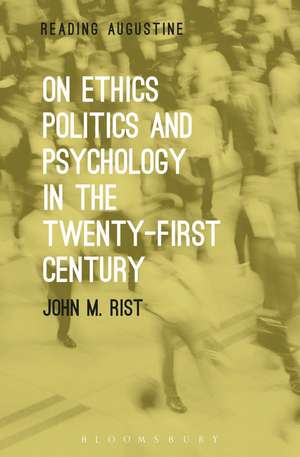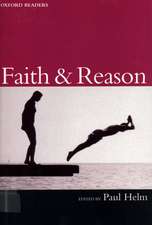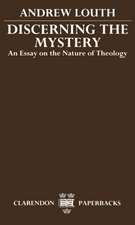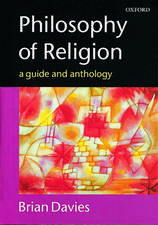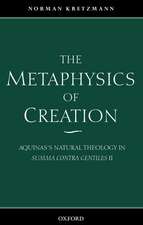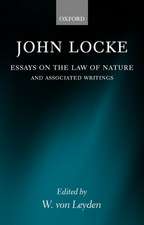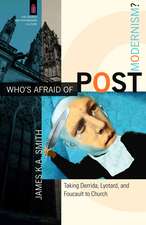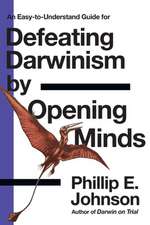On Ethics, Politics and Psychology in the Twenty-First Century: Reading Augustine
Autor Professor John M. Risten Limba Engleză Paperback – 29 noi 2017
| Toate formatele și edițiile | Preț | Express |
|---|---|---|
| Paperback (1) | 158.20 lei 6-8 săpt. | |
| Bloomsbury Publishing – 29 noi 2017 | 158.20 lei 6-8 săpt. | |
| Hardback (1) | 495.44 lei 6-8 săpt. | |
| Bloomsbury Publishing – 29 noi 2017 | 495.44 lei 6-8 săpt. |
Din seria Reading Augustine
- 15%
 Preț: 162.36 lei
Preț: 162.36 lei - 9%
 Preț: 150.96 lei
Preț: 150.96 lei - 14%
 Preț: 177.05 lei
Preț: 177.05 lei - 8%
 Preț: 157.75 lei
Preț: 157.75 lei - 13%
 Preț: 174.51 lei
Preț: 174.51 lei - 8%
 Preț: 151.38 lei
Preț: 151.38 lei - 8%
 Preț: 151.38 lei
Preț: 151.38 lei - 15%
 Preț: 175.53 lei
Preț: 175.53 lei - 8%
 Preț: 158.64 lei
Preț: 158.64 lei - 19%
 Preț: 169.08 lei
Preț: 169.08 lei - 14%
 Preț: 177.05 lei
Preț: 177.05 lei - 14%
 Preț: 176.44 lei
Preț: 176.44 lei - 15%
 Preț: 168.74 lei
Preț: 168.74 lei - 14%
 Preț: 176.17 lei
Preț: 176.17 lei - 19%
 Preț: 152.28 lei
Preț: 152.28 lei - 14%
 Preț: 171.22 lei
Preț: 171.22 lei - 44%
 Preț: 118.11 lei
Preț: 118.11 lei - 23%
 Preț: 171.85 lei
Preț: 171.85 lei - 13%
 Preț: 174.51 lei
Preț: 174.51 lei - 9%
 Preț: 157.32 lei
Preț: 157.32 lei - 8%
 Preț: 151.38 lei
Preț: 151.38 lei - 14%
 Preț: 170.50 lei
Preț: 170.50 lei - 15%
 Preț: 156.87 lei
Preț: 156.87 lei - 9%
 Preț: 150.50 lei
Preț: 150.50 lei - 15%
 Preț: 157.32 lei
Preț: 157.32 lei - 14%
 Preț: 163.91 lei
Preț: 163.91 lei
Preț: 158.20 lei
Preț vechi: 172.58 lei
-8% Nou
Puncte Express: 237
Preț estimativ în valută:
30.28€ • 32.90$ • 25.45£
30.28€ • 32.90$ • 25.45£
Carte tipărită la comandă
Livrare economică 21 aprilie-05 mai
Preluare comenzi: 021 569.72.76
Specificații
ISBN-13: 9781501307485
ISBN-10: 1501307487
Pagini: 192
Dimensiuni: 140 x 216 x 19 mm
Greutate: 0.27 kg
Editura: Bloomsbury Publishing
Colecția Bloomsbury Academic
Seria Reading Augustine
Locul publicării:New York, United States
ISBN-10: 1501307487
Pagini: 192
Dimensiuni: 140 x 216 x 19 mm
Greutate: 0.27 kg
Editura: Bloomsbury Publishing
Colecția Bloomsbury Academic
Seria Reading Augustine
Locul publicării:New York, United States
Caracteristici
Offers a guide to all of Augustine's major ethical arguments, while also applying them to contemporary debates and states of affairs
Notă biografică
John Rist is Professor Emeritus of Classics and Philosophy at the University of Toronto, Canada. He has published extensively on the Presocratics, Socrates, Plato, Aristotle, Plotinus and Neoplatonism, as well as Ethics, Patristics and Augustine. He is the author of fifteen books, including Real Ethics: Reconsidering the Foundations of Morality (2001), What is Truth? From the Academy to the Vatican (2008) and Plato's Moral Philosophy. The Discovery of the Presuppositions of Ethics (2012).
Cuprins
Introduction: Before AugustineChapter 1: The Principles of Augustine's Moral Empiricism: Love, Truth and SinChapter 2: Scientific Philosophy and First-Person ConfessionChapter 3: Augustine against Kantian Autonomy: 'Ought does not imply "Can"'Chapter 4: Augustine on the Possibility of Justice and the Necessity of RegretChapter 5: Augustine against godless 'Augustinians': Machiavelli and HobbesChapter 6: Augustine against Political Panaceas: the Example of Sir Thomas MoreChapter 7: Augustine against Utilitarianism and ConsequentialismChapter 8: Augustine and Rights TheoryChapter 9: Impersonality and HomogenizationChapter 10: Augustine against Religious and Theological ReductionismChapter 11: Augustine's Brag: Against Conventionalism and NihilismBibliographyIndex
Recenzii
An extremely enjoyable read, another product of the author's brilliance ... After devouring this book cover to cover, I had a much better idea of Augustine's implicit political inclinations, explained through his more well-known theological doctrines, and not in the least, through his refreshing, liberating complaints of today's modern Western world.
John Rist has found an idea format to take up Augustine's thought in relation to modern concerns . Rist's book effectively allows Augustine to speak out amidst current philosophical and political thought.
Rist's Reading Augustine will be a helpful text for those who are interested in how to reinterpret him in today's world. Readers will also find that Rist is passionate about reviving Augustine's theology and ethics against the inundating challenges of neoliberalism. Rist is definitely engaged not only in reinterpreting Augustine's multi-layered theological insights and ethical guidelines but also in applying his theological visions and ethical ideas to our society.
Most books on St. Augustine try to tell us what he said and what he meant in his own day and age. In this book John Rist does the opposite and tells us what Augustine would say if he were with us here and now. Rist does for Augustine what Plato did for Socrates, he brings him to life in the time of the reader. He speaks as Augustine would in response to our present circumstances: How can we still say "I" in an age of impersonal science, must theology be deductive and systematic, do we create ourselves and our gods, or do we look for salvation? The book is colorful and insightful as it addresses our theological, political, and moral situation.
In this 21st century polemic inspired by the early Christian controversialists, Rist offers an updated and corrected 'Augustine' who is informed by his own deep and wide knowledge of intellectual history. Ranging over questions of philosophical and theological methodology, philosophy of education, epistemology, moral psychology, ethics, and legal and political theory, he marshals this learning to argue for the enduring importance of Augustine and to radically critique the ethical and political theories of modernity.
John Rist has found an idea format to take up Augustine's thought in relation to modern concerns . Rist's book effectively allows Augustine to speak out amidst current philosophical and political thought.
Rist's Reading Augustine will be a helpful text for those who are interested in how to reinterpret him in today's world. Readers will also find that Rist is passionate about reviving Augustine's theology and ethics against the inundating challenges of neoliberalism. Rist is definitely engaged not only in reinterpreting Augustine's multi-layered theological insights and ethical guidelines but also in applying his theological visions and ethical ideas to our society.
Most books on St. Augustine try to tell us what he said and what he meant in his own day and age. In this book John Rist does the opposite and tells us what Augustine would say if he were with us here and now. Rist does for Augustine what Plato did for Socrates, he brings him to life in the time of the reader. He speaks as Augustine would in response to our present circumstances: How can we still say "I" in an age of impersonal science, must theology be deductive and systematic, do we create ourselves and our gods, or do we look for salvation? The book is colorful and insightful as it addresses our theological, political, and moral situation.
In this 21st century polemic inspired by the early Christian controversialists, Rist offers an updated and corrected 'Augustine' who is informed by his own deep and wide knowledge of intellectual history. Ranging over questions of philosophical and theological methodology, philosophy of education, epistemology, moral psychology, ethics, and legal and political theory, he marshals this learning to argue for the enduring importance of Augustine and to radically critique the ethical and political theories of modernity.
